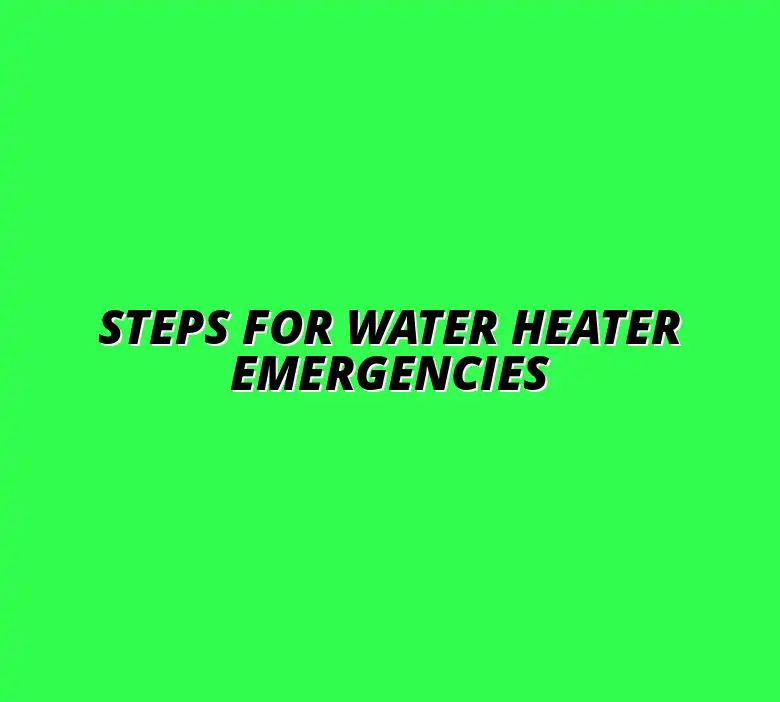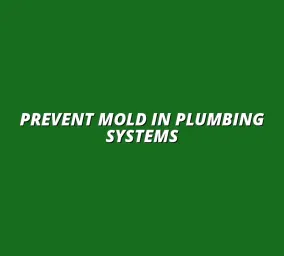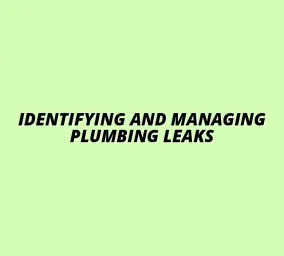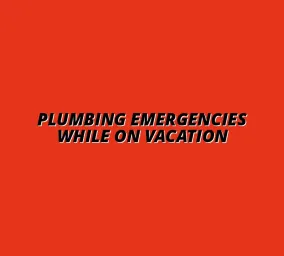Steps for Water Heater Emergencies
Understanding Water Heater Failures and Their Impact
Water heaters are essential for our daily routines, providing hot water for showers, laundry, and dishwashing. When they fail, it can cause significant inconveniences and even lead to costly repairs. Understanding the common causes and signs of water heater failures can help you act quickly before a minor issue becomes a major problem!
Water heater failures can arise from various issues, and knowing these can save you time and money. Let's explore the most common causes of these failures and how to recognize the early signs that indicate trouble. For immediate assistance with a water heater leak, consider contacting a professional plumber for emergency plumbing for water heater leaks.
Identifying Common Causes of Water Heater Failures
Water heaters can fail for several reasons, and pinpointing the cause is crucial for effective repairs. Here are some of the most common causes:
- Malfunctioning Thermostats: A faulty thermostat can prevent the water heater from heating water properly, leading to lukewarm or cold water.
- Leaking Tanks and Pipes: Leaks can be a sign of corrosion or damage, which can lead to water damage in your home. Learn how to stop pipe leaks from getting worse to prevent further damage.
- Electrical or Gas Supply Issues: Problems with the power source can disrupt the heating process, leading to inefficiencies or total failure.
Each of these issues can lead to significant problems if not addressed promptly. Regular maintenance and monitoring can help identify these issues before they escalate!
Malfunctioning Thermostats
Thermostats control the temperature of the water in your heater. If they malfunction, they may not accurately sense the temperature, resulting in water that is either too hot or too cold. This situation can lead to discomfort and wasted energy.
To check your thermostat:
- Set the thermostat to a desired temperature.
- Wait for a while and use a thermometer to measure the water temperature.
- If there's a significant difference, the thermostat may need replacing.
Leaking Tanks and Pipes
Leaking water heaters can cause extensive damage to your home. When water pools around your unit, it can indicate a cracked tank or damaged pipes. This situation requires immediate attention to prevent further issues.
To address leaks:
- Inspect the tank and connections for visible leaks.
- Check for rust or corrosion, which may indicate a more significant problem.
- Consider replacing the unit if leaks are severe.
Electrical or Gas Supply Issues
Water heaters typically rely on electricity or gas for operation. If there are issues with the supply, such as a tripped breaker or gas line problems, you might find yourself without hot water. It’s important to address these concerns swiftly!
To troubleshoot supply issues:
- Check the circuit breaker for tripped switches.
- Inspect gas lines for leaks or blockages.
- Contact a professional if you suspect a more serious issue.
Recognizing the Signs of a Water Heater Emergency
It’s essential to be aware of the signs that indicate your water heater may be failing. Recognizing these signs early can save you from an emergency situation later on. Here are some signs to watch out for:
- Unexpected Temperature Changes: Sudden fluctuations in water temperature can signal an issue.
- Unusual Noises from the Unit: Sounds like banging or hissing can indicate sediment buildup or other problems.
- Visible Leaks or Water Accumulation: Any pooling water around the unit should be addressed immediately!
Understanding these signs can help you take appropriate action before a failure occurs. Regular checks and maintenance can keep your water heater running smoothly for years! For helpful tips on preventative maintenance, check out these tips on maintaining your water heater regularly.
Unexpected Temperature Changes
If you notice that your water temperature is inconsistent, it could be a sign of a malfunctioning thermostat or heating element. This can cause hot water to suddenly turn cold, disrupting your daily activities.
To troubleshoot temperature issues:
- Test the water temperature at different taps.
- Adjust the thermostat settings and see if that resolves the issue.
- If problems persist, seek professional help.
Unusual Noises from the Unit
Sounds coming from your water heater shouldn’t be ignored. Noises like popping, rumbling, or hissing can indicate sediment buildup or pressure issues inside the tank. Addressing these sounds promptly can prevent future failures.
To investigate unusual noises:
- Listen for specific sound patterns to identify the cause.
- Consider flushing the tank to remove sediment buildup.
- Consult a professional if noises continue.
Visible Leaks or Water Accumulation
Seeing water pooling around your water heater is a clear sign of trouble. Leaks can lead to mold growth or structural damage if left unaddressed. It’s crucial to act quickly!
When you observe leaks:
- Turn off the water supply to the heater.
- Identify the source of the leak.
- Contact a plumber for repairs if necessary.
Long-Term Solutions and Preventative Measures
Once you've dealt with a water heater failure, it's vital to think about the long-term. This means not only addressing immediate causes but also implementing strategies that prevent future issues. By focusing on both repair and maintenance, you can ensure your water heater remains in good working order for years to come. This proactive approach can save you time, money, and stress. For comprehensive advice on maintaining your plumbing system, including your water heater, refer to our guide on preventing plumbing emergencies with maintenance.
One of the most effective ways to maintain your water heater is by considering professional repairs. If you notice problems, it's essential to evaluate whether those issues can be fixed or if replacement might be a better option. Knowing when to call an expert can make a big difference in your water heater's lifespan. Learn more about fixing a water heater issue with our repair guides.
Considering Professional Water Heater Repairs
When faced with persistent issues, the decision to call a professional can be crucial. It’s best to contact a licensed plumber if you encounter any of the following:
- Water leaks that worsen over time
- Repeated failures of the heating element
- Inconsistent water temperature
- Unusual smells or sounds from the unit
These signs indicate that a professional may be needed to diagnose and solve the problem effectively. Repairing your water heater can be significantly cheaper than a full replacement, especially if the issues are manageable. For bathroom plumbing maintenance, see our bathroom plumbing maintenance essentials guide.
When to Call a Professional
Knowing when to seek help is essential. If you're unsure about the severity of the problem, it's better to err on the side of caution. Here are some key indicators:
- Visible corrosion or damage to the tank
- Frequent trips to reset circuit breakers or ignite the pilot light
- Water discoloration or foul odors
Calling a technician is especially important if you smell gas around the heater, as that could indicate a serious hazard. In Driffold, Birmingham, consider contacting a plumber in Driffold, Birmingham for emergency plumbing services.
Evaluating Repair Costs vs. Replacement Options
Before making any decisions, it's wise to evaluate the costs associated with repairs versus replacement. Here’s a simple breakdown:
| Factor | Repair Costs | Replacement Costs |
|---|---|---|
| Aging Unit (over 10 years) | Often high | Consider replacement |
| Minor Issues | Usually low | Not necessary |
| Major Failures | Significant | Evaluate long-term benefits |
By analyzing these factors carefully, you can make an informed decision that best suits your needs.
Implementing Regular Maintenance Routines
To prolong the life of your water heater, regular maintenance is key! Implementing a routine can help catch small issues before they become major problems.
Scheduling annual inspections should become a part of your home maintenance plan. A qualified technician can check for potential issues and ensure your heater operates efficiently. Here are some key tasks to include:
- Checking the temperature and pressure relief valve
- Inspecting the anode rod for corrosion
- Testing the thermostat settings
Scheduling Annual Inspections
Annual inspections are a proactive way to avoid unexpected failures. During these inspections, technicians can identify early signs of wear and tear. Keeping a maintenance log can also help track the health of your water heater.
Regular check-ups can lead to increased efficiency, lower energy bills, and extend the lifespan of the unit!
Flushing the Tank to Prevent Sediment Buildup
Flushing your water heater regularly is another essential maintenance step. Sediment can accumulate in the tank, causing inefficiencies and potential damage. Here’s how to do it:
- Turn off the power or gas supply.
- Connect a hose to the drain valve.
- Open the valve and let it drain.
- Flush the tank until the water runs clear.
By completing this simple task once a year, you can help maintain optimal performance and avoid premature failure.
Common Questions About Water Heater Failures
Many homeowners have questions about water heater issues. Addressing these can help demystify problems and prepare for potential emergencies. Understanding how to prevent failures is equally important.
What Should You Do if You Smell Gas?
If you ever smell gas near your water heater, it's crucial to act quickly. First, leave the area immediately and avoid using any electrical devices. Then, contact your gas company or local emergency services.
How Can You Prevent Future Water Heater Issues?
Preventing future problems often comes down to routine maintenance and quick identification of potential issues. Make sure to stay vigilant for signs of trouble and schedule regular check-ups!
Is a Water Heater Failure Covered by Home Insurance?
Many home insurance policies cover water heater failures, but coverage may vary. It’s important to check your policy details to understand what is included. If in doubt, contacting your insurance provider for clarification can provide peace of mind.
Final Thoughts on Handling Water Heater Emergencies
Being prepared for a water heater emergency can make all the difference. Keeping a checklist of steps to take can help ensure you're ready should anything happen.
Ensuring Preparedness for Future Incidents
Take the time to understand your water heater system and know how to respond in an emergency. Keeping a toolkit handy and knowing your shut-off locations can empower you during a crisis!
Encouraging Regular Maintenance for Longevity
Lastly, remember that regular maintenance pays off in the long run. By taking care of your water heater, you can enhance its performance and lifespan.






